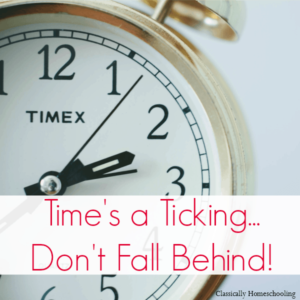Scholé, or Restful Learning, Is Vital to Your Homeschool
This post may contain affiliate links. For more information, please read my disclosure policy.
Why is restful learning and Scholé is important for your homeschool? Let’s compare a sample of days in the lives of two homeschool mothers.
Life at a Frantic, Chaotic Pace
First, our hectic mother rushes to get breakfast on the table and the morning chores are done. Then it’s a load of laundry started while the latest fight begins between two of her children.
Once through the morning chores, she scrambles to get memorization, Latin, spelling, grammar, penmanship, literature, phonics, writing, math drill, math concepts, and a couple of math games in before lunch.
Lunch is a desperate to get children fed, laundry moved, babies and toddlers down for their naps before she and her older children move on to the next part of the homeschool.
She’s exhausted and it’s only noon, but no time to rest. History, science, geography, art, and music practice must be done before running out the door to the many lessons the children have.
Soccer, basketball, ballet, piano, violin, orchestra, ice skating… is there no end? And she still needs to get home to put dinner on the table, get children to bed, tidy the house, and spend some time with her husband.
I don’t know about you, but this is exhausting just reading about it!
How much do you believe the children are retaining from this hectic pace? The memory list? When do they have time to relax, develop hobbies and interests of their own, contemplate what they’ve learned today?
What about yourself? When do you have time to contemplate what you’re studying with the children and apply it to your own life?
Do you even have time to breathe?
A Life of Restful Learning… Scholé
There’s a better way of homeschooling and living. That’s one with a focus on restful learning. Learning should be peaceful, contemplative, with an eye towards the beautiful.
A day where our random homeschool mother enjoys a leisurely breakfast with her children discussing their favorite pieces of poetry, good books they’ve read, and thoughts on the literature book they’re reading as a family.
She and the children move deliberately through the chores before sitting down to the basics. Time spent reading, writing, learning Latin, and studying math… one math program mind you, not three.
Lunch is spent enjoying a family read-aloud, enjoying the new poem the family is memorizing, and cleaning the kitchen as a family.
Quiet time is for everyone in the family, not just the youngest children. The high school teens sit down to read great books in literature, history, or science. The younger children curl up with good books. The little ones sleep. She has time to breathe.
After quiet time, the family separates. Science experiments are completed. History projects are begun. Social activities occur. Lessons happen. Some days the children simply relax and play at home with each other.
Scholé isn’t about reducing the quality of the education as slowing down the pace. It’s about giving you and your children time to breathe, contemplate, and discuss what you’re learning.
It’s about Teaching From Rest.
How do you give yourself time to breathe?
Recommended Reading









I agree completely! I think most homeschool families are doing way too much, and the kids never have down time to develop hobbies. It’s nice to see others putting this idea into words.
Down time to develop hobbies is critical! That’s how my teenagers developed strong ideas for both their passions and what fields they’d like to enter as adults. 🙂
Homeschooling sometimes gravitates towards school at home. I know when this happens because all of a sudden I feel frazzled. That’s when I switch gears and slow things down.
So much comes from discussion and reading and time with one another, and in our community.
Thank you for sharing (and for linking up to the #SHINEbloghop).
Wishing you a lovely week.
xoxo
It’s so easy to get caught up in checking off the list rather than focusing on the learning and skills kids need. Sometimes it’s best to do as you do, Jennifer, switch gears and slow down!
Sometimes I talk to other homeschool moms and am surprised at how much more they do than we do =) I just like to make sure that we are moving in a forward direction, not dwelling on whether we get to everything each day. Thanks for spelling out a clear picture of what leisurely learning looks like!
There is a big difference between rushing through tons of material that no one remembers and leisurely focusing on a few important skills and ideas. It’s funny how some crisis years where we cut back to the minimum, the children make their biggest leaps forward! 🙂
It can be so hard to escape from the mindset that she who checks off the most boxes wins. Scholé reminds us that it is connections made that matter (between two people and also between people and books).
This post is a reminder we all need. Thanks.
Mystie, it’s definitely the connections that matter. I like to think about it as a conversation. A conversation between parent and child, a conversation between children and teacher, and eventually joining the great conversation that began back in the mists of time and goes on today in libraries, universities, and living rooms around the world. 🙂
Once again you are right, thanks again for the reminder, sometimes I do get caught up in the haste to achieve. Thanks for linking up at Good Morning Mondays. Blessings
It’s so easy to get caught in the haste to succeed, to get where we want to be. Sometimes I think we’re like kids in the back seat, “Are we there yet? Are we there yet?” 🙂